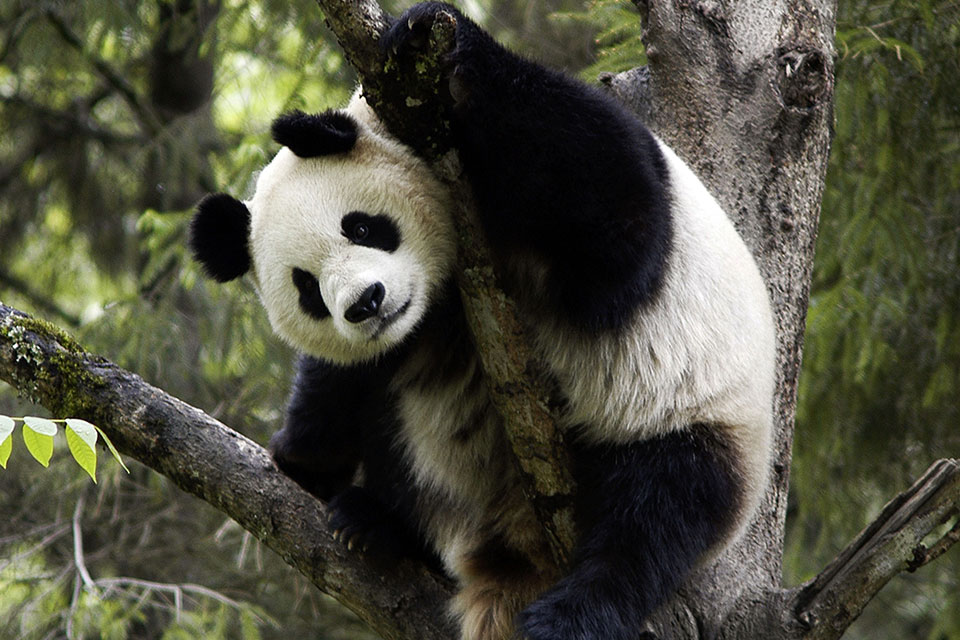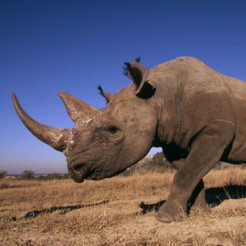It is estimated that only around 1,860 giant pandas remain in the wild today.
The giant panda habitat was once spread throughout China, northern Vietnam and northern Myanmar. But now the giant panda is found in the wild in just six isolated mountain ranges in Gansu, Shaanxi and Sichuan Provinces in south-central China.
Your adoptions will help protect giant pandas, and will help fund our vital work around the world. When you choose an animal adoption, you are supporting both your chosen animals as well as wider work to help bring our world back to life.
Adopt a giant panda and receive
Two-thirds of all wild pandas now live in nature reserves. You may have heard the great news that giant pandas have been downlisted from the IUCN Redlist. They are no longer endangered. However, they are still threatened, so we still need your support to help protect them.

Threats faced by giant pandas

Loss of Food Supplies
In some places, grazing livestock, harvesting bamboo and collecting medicinal herbs is still a threat to pandas.
Habitat Fragmentation
Roads and railways are increasingly cutting through the forest, which isolates panda populations and prevents them from breeding.
Climate Change
Pandas that live in isolated mountains are especially vulnerable to warming - as they already have small ranges that will shrink and fragment further.

Tourism
Tourism in the region is increasing and this is putting additional pressure on giant panda habitat.
How we can help
In 1980 we became the first international conservation organisation invited to work in China – and we’ve been working with the Chinese government to help protect giant pandas ever since. This includes helping to designate and set up protected areas to keep more panda habitat intact.
We also work with local communities to help them use their natural resources more sustainably, and encourage alternative livelihoods such as bee-keeping – things that don’t negatively impact on the panda’s habitat.
Your adoption and support will help us:
- create wildlife corridors to reconnect panda habitats
- restore habitats
- increase the area of habitat under legal protection
- support local communities manage forest resources sustainably
- fund our other essential work around the world

Pandas can swim and are excellent tree climbers.
Last minute gift?

Free delivery
We offer free delivery but ask you to consider helping to cover postage with an optional £3 donation taken at checkout. This means more of your gift can go towards supporting your adoption animal and our wider work.
Your pack will be sent within 2-3 working days - but allow up to 5 working days for it to arrive.
Giant panda adoption FAQs
Yes, you can adopt a giant panda with WWF. Donations from giant panda adoptions go both directly to support giant pandas, as well as to fund our wider work to protect nature and our planet. Adoptions are symbolic for donating and supporting our conservation work with different species. By adopting a giant panda, you will be supporting a whole group of giant pandas, rather than one individual.
You can adopt a giant panda with WWF from just £3 a month via Direct Debit or a £36 one-off payment. To adopt a giant panda with WWF, select your donation amount on the widget, click 'Adopt Now' and then complete your donation via our secure online checkout.
You can adopt a giant panda with WWF from just £3 a month via Direct Debit or a £36 one-off payment. Your money goes further by Direct Debit as this supports our long-term planning and helps keep our administration costs down.
When you adopt a giant panda with WWF, 50% of your donation will fund programs of work that directly support giant pandas while the remaining 50% will fund other projects that need it most. After adopting a giant panda you'll receive a welcome pack including an optional toy and note from the WWF team welcoming you on board. We'll keep you updated on how you're supporting our vital work by sending you three adoption updates a year.
Giant panda adoptions help us; work with Chinese government to set up protected areas for panda habital; create wildlife corridors to reconnect panda habitat; restore degraded panda habitats.
Positive steps have been made, but the giant panda population is not out of the woods yet, as they are still classified as vulnerable. Around 1,860 giant pandas remain in the wild today, and although their habitat is shrinking and fragmented, the giant panda is living proof that conservation works.















